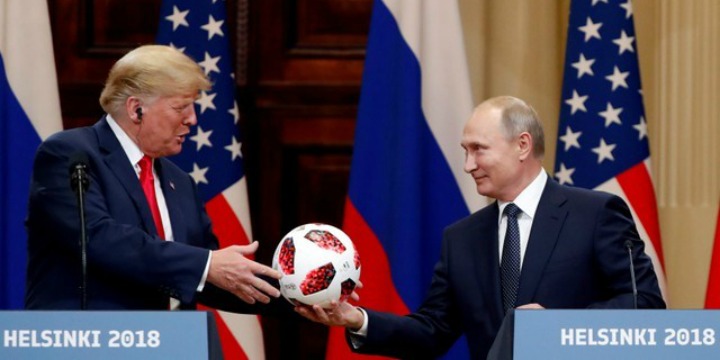Putin Needs Quiet to Achieve His Goals in the Middle East
 by Oded Granot / JNS.org
by Oded Granot / JNS.org

US President Trump receives a football from Russian President Putin as they hold a joint news conference. Photo: REUTERS/Grigory Dukor.
JNS.org – Russian President Vladimir Putin’s surprise stopover in Syria on Tuesday — accompanied by his minister of defense, Sergei Shoigu, and other high-level officers — for a meeting with Syrian President Bashar Assad at Moscow’s military headquarters in Damascus, made minor headlines in both countries so as not to betray the Kremlin’s true concern: that the entire Middle East could erupt into flames at any moment, following the assassination of Iranian Gen. Qassem Soleimani.
Putin’s fear that the region is perilously close to a conflagration is evidenced, among other things, by Russia’s reserved response to the assassination. Iran and Russia are, supposedly, allies. Only recently they conducted a joint military exercise in the north Indian Ocean. One might have expected Putin to castigate Donald Trump for his “irresponsible act,” express some measure of empathy for Iranian Supreme Leader Ayatollah Ali Khamenei, or publicly come out in support of Iran’s right to exact harsh and painful revenge. None of this happened. The Russians anemically condemned the assassination and sufficed with offering condolences to Iranian diplomats in Russia. And none of this is a coincidence.
We need to remember that Putin isn’t just the world champ of exploiting opportunities for political gain; he is also a master of spotting danger in time. A wild Iranian retaliation against Americans stationed in the Middle East would assuredly compel a disproportionate response from the preeminent global superpower. The distance between that and all-out war, which could also harm Russian interests, would be exceedingly short.
Naturally, Putin’s two most pressing concerns pertain to Syria, which is Russia’s primary outpost in the region. First: American forces are still stationed in the country’s east. If the Iranians try harming them, the United States will act in Syria — and not just in the east but wherever they find pro-Iranian militias. This would greatly embarrass the Russian forces currently in Syria.
Putin’s other concern is that those Iran-backed militias will receive orders from Tehran to act against Israel, from Syrian territory, as part of Iran’s revenge. Putin understands that Israel would retaliate against any such aggression, and would perhaps even cross certain red lines established by Jerusalem and Moscow — for example, targeting symbols of the Assad regime.
Russian sources on Tuesday indicated that Putin’s surprise visit to Damascus was an attempt to ensure that Assad would try to restrain and assuage the pro-Iranian militias on his soil. Putin wants quiet in Syria, and will also discuss the issue with his Israeli hosts during his upcoming, pre-planned visit, which has become even more pressing and pertinent in the wake of Soleimani’s demise.
From Damascus, Putin continued on to Ankara, Turkey to alleviate tensions in yet another region. In Libya, a war is on the verge of erupting between Field Marshal Khalifa Haftar’s secular army, supported by Russian mercenaries, and the Islamist government in Tripoli, supported by Turkish mercenaries.
Putin will try persuading Turkish President Recep Tayyip Erdogan that the battle is already lost because Haftar’s army has already seized the vast majority of Libyan territory, and that Moscow and Ankara should focus on cooperating to stave off a larger conflagration, if possible, along the Turkish frontier with Syria.
If he succeeds in his missions to lower the flames, Libya could become Russia’s second naval foothold in the Mediterranean basin, after Syria.
Oded Granot is a journalist and international commentator on the Middle East. A version of this article first appeared in Israel Hayom.
 Police Stop Anti-Zionist Agitators From Accessing Florida University President’s Home as Students Revolt Nationwide
Police Stop Anti-Zionist Agitators From Accessing Florida University President’s Home as Students Revolt Nationwide Nearly One in Five Young People Sympathize With Hamas, 29% Say US Should Reduce or End Alliance With Israel: Poll
Nearly One in Five Young People Sympathize With Hamas, 29% Say US Should Reduce or End Alliance With Israel: Poll Ilhan Omar Silent After Daughter’s Arrest, Suspension for Role in Columbia University Anti-Israel Protest
Ilhan Omar Silent After Daughter’s Arrest, Suspension for Role in Columbia University Anti-Israel Protest Cultural Center Backed by Iran’s Revolutionary Guard Plans to Produce Films About Attack on Israel
Cultural Center Backed by Iran’s Revolutionary Guard Plans to Produce Films About Attack on Israel How Does Ilhan Omar Really Feel About Iran?
How Does Ilhan Omar Really Feel About Iran? This Passover, Combine Respect for Tradition with the Courage to Innovate
This Passover, Combine Respect for Tradition with the Courage to Innovate Israel’s Iran Attack Carefully Calibrated After Internal Splits, US Pressure
Israel’s Iran Attack Carefully Calibrated After Internal Splits, US Pressure Palestinian Cameramen Exposed in New Footage Documenting Oct. 7 Atrocities Side by Side with Terrorists
Palestinian Cameramen Exposed in New Footage Documenting Oct. 7 Atrocities Side by Side with Terrorists US Money to Convicted Terrorists; US Training to Aspiring Terrorists
US Money to Convicted Terrorists; US Training to Aspiring Terrorists Man Arrested in Paris After Iran Consulate Incident
Man Arrested in Paris After Iran Consulate Incident



 This Passover, Combine Respect for Tradition with the Courage to Innovate
This Passover, Combine Respect for Tradition with the Courage to Innovate How Does Ilhan Omar Really Feel About Iran?
How Does Ilhan Omar Really Feel About Iran? Cultural Center Backed by Iran’s Revolutionary Guard Plans to Produce Films About Attack on Israel
Cultural Center Backed by Iran’s Revolutionary Guard Plans to Produce Films About Attack on Israel Ilhan Omar Silent After Daughter’s Arrest, Suspension for Role in Columbia University Anti-Israel Protest
Ilhan Omar Silent After Daughter’s Arrest, Suspension for Role in Columbia University Anti-Israel Protest Tehran Signals No Retaliation Against Israel After Drones Attack Iran
Tehran Signals No Retaliation Against Israel After Drones Attack Iran